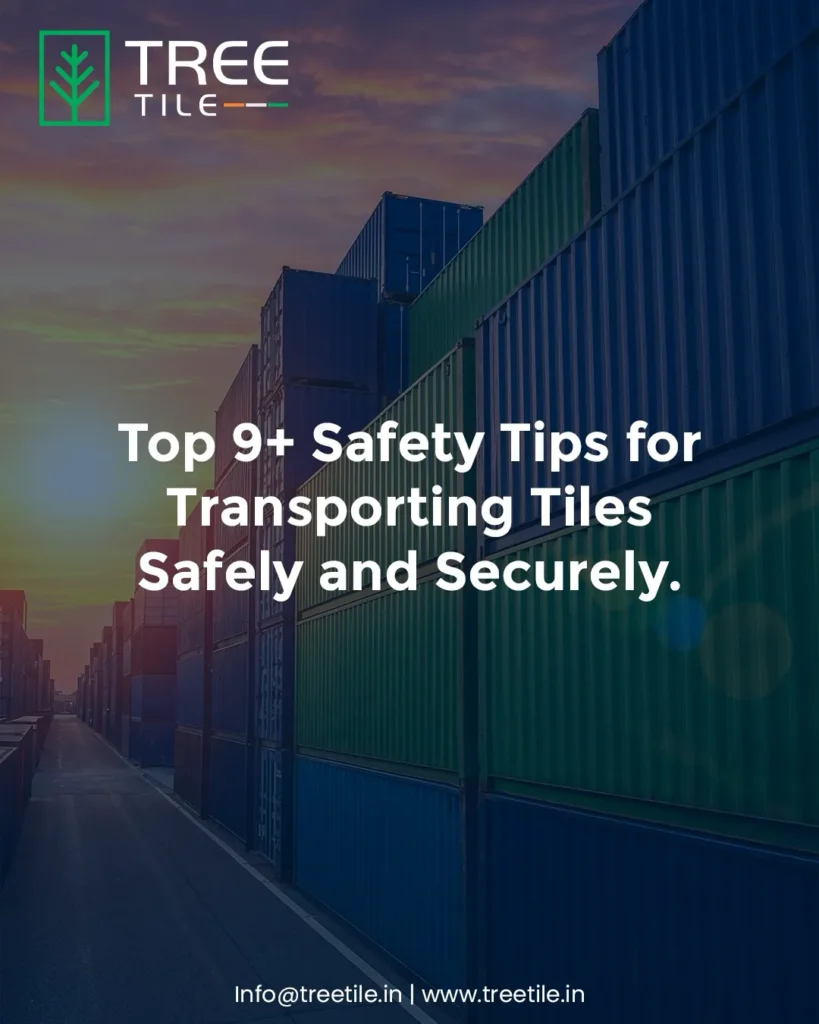
Welcome to Tree Tile – India’s trusted tile innovator and your expert source for everything related to ceramic and porcelain tiles. As a government-recognized 1 Star Exporter, Tree Tile stands at the forefront of quality, precision, and commitment in the tile industry. Headquartered in Morbi, Gujarat, we specialize in manufacturing and exporting premium-grade tiles to customers across the globe, setting benchmarks with our cutting-edge designs, sustainable practices, and reliable delivery systems. What makes us different is our holistic approach: we don’t just sell tiles—we engineer trust, safety, and long-term satisfaction. Backed by rich industry experience and advanced logistics planning, this article offers you exclusive, real-world insights from our team on the safest and most efficient ways to transport tiles, reflecting Tree Tile’s mission to protect your investment from factory floor to final installation.
Here’s What you will get from this article
- Not Just Fragile — Why Tile Transport Needs a Specialized Strategy
- Tree Tile’s Global Shipping Experience: 40+ Countries, 0 Compromise on Safety
- Top 9+ Proven Safety Tips for Tile Transport
- Use Layered Corrugated Cartons with Edge Reinforcement
- Vacuum Palletization with Polywrap & Heat Shrink Film (Optional)
- Stack Tiles Vertically (Not Flat) During Loading
- Avoid Mixed-Size Pallets: Always Segregate Sizes
- Add Fumigation for Wooden Pallets for Sea Containers
- Shock Indicator Labels and Tilt Sensors on Shipments (optional)
- Container Transportation Insurance
- Double Inspection Before Container Sealing
- Trained Staff in Warehouse for Handling Tiles Pallets While Loading in Container
- Bonus Tip: Avoid Offloading During Rain or Humid Conditions
- Why Dealers, Builders & Distributors Choose Tree Tile for Hassle-Free Shipments
- Order Tiles from Tree Tile — Professionally Packed, Globally Shipped, Damage-Free
Not Just Fragile — Why Tile Transport Needs a Specialized Strategy

When it comes to moving tiles, many assume that a sturdy box and some bubble wrap are enough. But at Tree Tile, we know better. Tiles—especially ceramic, vitrified, and porcelain types—may appear strong, but during transport, they reveal just how delicate and complex they really are. These materials are highly sensitive to pressure, impact, and even subtle vibrations during transit. What’s often overlooked is that damage doesn’t always mean visible cracks—micro-cracks, internal stress fractures, or chipped edges can happen when industry-specific protection methods aren’t followed. These seemingly minor flaws could eventually impact the performance or appearance of tiles after installation.
That’s why standard logistics solutions simply don’t work. Using generic courier or shipping services that treat tiles like any other boxed item is a leading cause of avoidable damage. Instead, Tiles require a dedicated transport strategy, including custom crating, palletization techniques that absorb shock, climate awareness, and stacking patterns that distribute weight evenly.
Tree Tile’s Global Shipping Experience: 40+ Countries, 0 Compromise on Safety

Tailored for Every Route and Region
Every destination presents its own set of challenges. Tropical regions with high humidity levels require advanced moisture barrier packaging, while cold-climate zones like Northern Europe need thermal-resilient wrapping materials to prevent contraction cracks caused by freezing temperatures. As experts in both road and sea freight logistics, Tree Tile engineers the packaging strategy based on the shipping route, transit duration, and climatic impact—not just the product size. Our logistics team routinely customizes solutions with vacuum-sealed moisture films, desiccant bags inside shipments, and rigid corner guards for ocean-bound containers, ensuring structural stability while resisting environmental degradation.
Export-Ready Standards with No Compromise
Our global shipping process is anchored by stringent safety protocols that go beyond local transport norms. Tree Tile uses ISO-certified, export-grade packaging materials, every box reinforced and every pallet sealed under conditions compliant with international shipping and customs regulations. This includes:
Clear, bilingual labeling for customs visibility (HS code, quantity, material type, origin).
Anti-slip wooden pallets tailored for both forklifts and container stacking.
Shrink-wrapping with UV-resistant film to protect tiles from sun exposure during port holds or inland trucking in hot zones.
Top 9+ Proven Safety Tips for Tile Transport
Transporting tiles is not just about getting products from one place to another—it’s about ensuring every tile arrives in perfect condition, without breakage, fungus, or loss of finish. As an experienced global tile exporter, Tree Tile follows proven, highly refined safety protocols that combine strength, sustainability, and smart logistics. Here are the industry-best tips we recommend based on our deep, hands-on export expertise:
Use Layered Corrugated Cartons with Edge Reinforcement
Tree Tile’s Box Strength vs. Industry Standard

Tree Tile ensures every tile shipment is protected by using high-compression packaging that meets or exceeds industry benchmarks. Our boxes are engineered for outstanding compressive strength, with edge and corner design focused on durability and load distribution.
Industry Benchmark: Standard 3-ply cartons in the market achieve an effective compressive strength of about 72–74% of their maximum capacity, while 5-ply cartons can reach around 80–82%, offering extra margin especially for heavier loads.
Tree Tile’s Approach: Our boxes—customized per tile size and destination—are selected and designed based on tested compressive strength, not just layer count. We use enhanced construction methods (such as strong adhesive joints, reinforced corners, and quality materials) to ensure high resistance to stacking pressure, meeting the protective needs of both standard and heavy tiles.
Eco-Friendly, Recycled Materials & Corner Protection
Tree Tile is committed to sustainability. Wherever possible, we select recycled fiberboard for our cartons. For heavier tiles, we further strengthen corners with protective buffers—helping absorb shocks and prevent crushing damage during export.
Vacuum Palletization with Polywrap & Heat Shrink Film (Optional)
Prevents Lateral Shifting During Sea Transport
Tree Tile offers optional vacuum-sealed pallet packing, where tile boxes are tightly wrapped using polyfilm under vacuum pressure. This process removes excess air and compresses the full pallet into a compact, solid block.
Moisture & Fungus Protection with Stretch Wrap + Heat Sealing
After vacuum wrapping, pallets are secured using a combination of stretch wrap and heat shrink film (if needed). This multi-layer seal forms a barrier against:
Humidity & condensation in coastal ports
Water penetration during unloading
Fungal growth or surface dulling from moisture exposure
Eco-Friendly Option: Steel Pallet Box (Ceramic Iron Pallet)
For clients requesting a greener alternative, Tree Tile also offers eco-conscious steel pallet boxes, also known as ceramic iron pallets.
These are super sturdy, reusable, and ideal for heavy formats or large slab tiles.
Once packed with secure pallet straps, they prevent movement even better than traditional wooden pallets.

Fumigation for Hygiene & Compliance
All pallets—wood or steel—are thoroughly fumigated before export. This prevents the growth of:
Mold, Microorganisms, Bacteria inside packaging during long sea transit
Stack Tiles Vertically (Not Flat) During Loading
A lesser-known but highly effective method for safe tile transport is to stack tiles vertically on their edge, not flat. This approach is critical for reducing gravitational stress: when tiles are stacked flat, the entire weight is distributed directly downward, putting extra pressure on the lower tiles and increasing the risk of corner cracking, hairline fractures, or breakage—especially during sharp movements or vibrations in transit.
By stacking tiles vertically, the weight and load are more evenly distributed across the tile’s edge, which is structurally stronger than the face. This minimizes pressure points and absorbs shocks better, making the stack more resistant to impact or uneven surfaces. Leading logistics experts and tile distributors recommend this practice not only for clay and slate roofing tiles, but also for ceramic, porcelain, and vitrified tiles used in building and renovation projects.
Avoid Mixed-Size Pallets: Always Segregate Sizes
One of the most common packaging mistakes in tile transport is mixing different tile sizes on the same pallet—for example, stacking smaller 300x600mm tiles over larger 800x800mm or 1200x1200mm slabs.
Why This Is a Problem
When mixed together, the load becomes uneven, leading to:
Point-pressure build-up on larger tiles below
Increased chances of cracks, edge chipping, or breakage during transport
Difficulty in securing the load properly
Risk of carton collapse under shifting weight
This is especially risky in export logistics, where tiles experience long transit durations, multiple handlings, and movement across sea and land.
Tree Tile’s Smart Packaging Approach
At Tree Tile, we never mix sizes on the same pallet. Instead, we use smart, size-based segregation techniques:
Each tile size is packed on dedicated pallets, clearly marked and isolated.
For multi-size orders, we label and zone pallets separately, ensuring easy unloading and safe storage at the destination.
We also use custom pallet heights and wrapping tension depending on the tile size and weight, reducing stress on the cartons.
Add Fumigation for Wooden Pallets for Sea Containers
Why is this essential?
Tiles, especially when shipped over long distances by sea, can absorb moisture from the humid environment inside containers. This silently causes problems like glaze dulling, loss of shine, and even the development of fungus or mildew on the tiles—issues that may only become visible after delivery.
Tree Tile’s Solution
Fumigated Wooden Pallets: To control biological risks, Tree Tile ensures all wooden pallets are properly fumigated before loading. This process eliminates mold, bacteria, and microorganisms that could thrive on or inside wooden surfaces during a lengthy sea journey.
End Result:
With fumigated wooden pallets Tree Tile customers benefit from shipments that are:
Free from hidden bacterial or fungal growth.
Protected against humidity and condensation.
Delivered with a beautiful, intact glaze and no surface dullness—even after long sea voyages.
Shock Indicator Labels and Tilt Sensors on Shipments (optional)
How it works
Shock indicator labels (like those from ShockWatch) are tamper-proof devices that adhere to shipment packages and visually signal if the carton has experienced impact or mishandling above a set g-force threshold. When triggered by drops or shocks, the labels change color, making mishandling immediately visible to handlers and clients. Tilt sensors monitor if a pallet or crate has been tipped beyond a safe angle—a key risk with heavy tiles.
Real-time tracking: Logistics team and customers can identify precisely when and where impact or tilting has occurred. This is especially useful during vessel offloads, customs inspections, and reloading phases at high-traffic ports in Africa and the GCC.
Immediate alerts and claims: Activated indicators prompt recipients and inspectors to check for damage before accepting the goods—streamlining accountability and supporting transport claims.
Container Transportation Insurance

Why Insurance of Goods Matters at the Time of Exporting
Risk mitigation: International transport exposes shipments to risks such as damage, loss, theft, accidents, delays, piracy, and even political unrest. Insurance ensures that if something goes wrong—be it from rough handling, container loss at sea, or disaster—you are financially covered and not left to absorb the full loss.
Peace of mind and credibility: Insured shipments provide peace of mind to both exporters and buyers, demonstrating reliability and professionalism. Many contracts and letters of credit require proof of insurance for compliance and trust.
Legal and contractual compliance: Some destinations may legally mandate insurance or require it under trade contracts, helping you avoid fines, disputes, or rejection at customs.
What does Container Insurance Cover for Tiles?
Physical damage: Breakage, chipping, cracks, or water damage resulting from accidents, improper handling, rough seas, or bad weather.
Loss or theft: Compensation if your tile shipment is lost entirely or partially, stolen, or subject to piracy.
Incidents during transshipment: Protection during customs inspections, reloading, or when shipments are transferred between multiple vehicles or vessels.
General average events: If cargo must be jettisoned or the vessel endangered, marine insurance ensures losses are shared and compensated equitably among all cargo owners, rather than solely at your expense.
All-risk coverage (where selected): Some policies also cover risks like infestations, customs rejection, and other unforeseen perils.
Double Inspection Before Container Sealing

Final Layer Check for Accuracy and Safety
Physical Damage: Boxes and pallets are checked for any dents, open edges, or watermarks.
Tile Count & Quantity Verification: Cross-verify the ordered quantity against packing slips and container loading plans.
Label & Sticker Accuracy: Each box is checked for correct product codes, sizes, shades, and barcodes, ensuring your consignment meets import compliance at destination.
Video-Recorded Inspections for International Clients
To offer complete transparency, suppliers video records the full container loading and inspection process. This footage is:
Shared with overseas clients as proof of safe, accurate packing.
Used internally for audit control and accountability.
Appreciated by importers, especially when shipments involve customs declarations or high-value projects.
Open to Third-Party Inspection at Unit
Welcome third-party inspections before dispatch, arranged by clients or independent agencies. These inspections can be conducted at factory to verify:
Product quality and packaging
Loading standards
Compliance details (labeling, documentation, palletization)
Trained Staff in Warehouse for Handling Tiles Pallets While Loading in Container

At Tree Tile, we understand that even the best packaging can’t protect tiles if they’re handled carelessly. That’s why we have a dedicated, well-trained warehouse team that specializes in safe and efficient pallet handling during container loading.
Expert Handling Under Supervision
Every container is loaded by trained professionals who follow strict handling protocols under the supervision of senior logistics staff. Our team is experienced in:
Managing various tile sizes and weights
Using forklifts and manual handling techniques safely
Aligning pallets inside the container to maximize space while minimizing pressure and movement
Final Ground Staff Checks Post-Loading
Once all pallets are properly loaded:
Our ground staff performs a final checklist that includes carton condition, order count, pallet positioning, and label visibility.
This ensures every order leaving Tree Tile’s facility is 100% verified, stable, and safe for export.
Bonus Tip: Avoid Offloading During Rain or Humid Conditions
Rain and high humidity might seem harmless, but for tiles, they can be serious threats. Moisture exposure during offloading can lead to waterlogging, edge blistering, glaze dulling, or even fungal growth—especially on glossy or unpolished tiles.
Why It’s Risky
Wet conditions allow moisture to seep into tile edges and cartons
Saturation can weaken packaging, encourage surface spotting, and reduce shelf life
Damp tiles may later develop mildew or discolouration, affecting both finish and quality
Tree Tile’s Preventive Action
We proactively reschedule offloading, in coordination with logistics partners and clients
Shipments are kept in covered storage or dry warehouses until conditions improve
Special care is taken near coastal or monsoon regions to avoid avoidable damages
Why Dealers, Builders & Distributors Choose Tree Tile for Hassle-Free Shipments
International buyers consistently choose Tree Tile not just for our premium tile designs and quality, but for the reliability and safety of our global shipments. Thanks to our expert packaging standards, size-wise pallet segregation, moisture protection, and double inspection protocols, clients receive their orders without the common issues of breakage, delays, or rework. Many of our overseas distributors have shared how Tree Tile’s efficient packing process led to zero damage upon arrival, even for large-format tiles and extra-long sea routes.
Many international distributors have observed a significant drop in replacement and damage-related costs after switching to suppliers who prioritize secure and professional tile packaging. Proper packing, size segregation, moisture protection, and detailed inspections help eliminate common issues like breakage, edge chipping, and transit damage. This reduces the need for returns, refunds, or resends—leading to cost savings and smoother operations. Whether it’s a builder working on tight deadlines or a wholesaler handling large volumes, reliable and damage-free shipments allow them to save time, money, and customer service effort, making partners with strong logistics practices the preferred choice in the global tile market.
Order Tiles from Tree Tile — Professionally Packed, Globally Shipped, Damage-Free
Purchase tiles directly from Tree Tile with total confidence — every box is professionally packed and sealed using industry-grade materials, ensuring both health and safety during transport. Whether you’re ordering small lots or full container loads, our team follows a strict risk assessment and safe manual handling process at every stage, minimizing potential breakage or damage.
We supply bulk tile shipments in all major formats, including 300x600mm, 600x600mm, 800x800mm, and 1200x1200mm. For sensitive, high-gloss or polished surfaces, we offer custom packaging solutions – including edge protectors, special liners, and region-specific additions like desiccants for climate protection. Even when using tile outdoors or in high-moisture regions, our packaging preserves the original finish with care.
Whether your project involves heavy slabs or fragile finishes, we assist in the handling of goods with thoughtfully designed loading guides and moisture control options. As tile is a commonly used material in both commercial and residential applications, we make it easy for distributors, architects, and builders to order confidently — knowing their shipment will arrive in excellent condition.
Explore our full guide to tile packaging and export support to see how Tree Tile helps streamline your supply chain. Tile helps define the visual appeal of your project—Tree Tile helps deliver it safely, globally.



